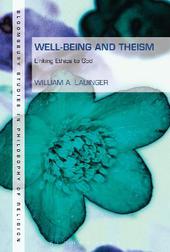
|
Well-Being and Theism: Linking Ethics to God
Paperback / softback
Main Details
| Title |
Well-Being and Theism: Linking Ethics to God
|
| Authors and Contributors |
By (author) Dr William A. Lauinger
|
| Series | Bloomsbury Studies in Philosophy of Religion |
|---|
| Physical Properties |
| Format:Paperback / softback | | Pages:208 | | Dimensions(mm): Height 229,Width 152 |
|
| Category/Genre | Philosophy of religion |
|---|
| ISBN/Barcode |
9781628926880
|
| Classifications | Dewey:210 |
|---|
| Audience | |
|---|
|
Publishing Details |
| Publisher |
Bloomsbury Publishing Plc
|
| Imprint |
Bloomsbury Academic USA
|
| Publication Date |
27 March 2014 |
| Publication Country |
United States
|
Description
Well-Being and Theism is divided into two distinctive parts. The first part argues that desire-fulfillment welfare theories fail to capture the 'good' part of 'good for', and that objective list welfare theories fail to capture the 'for' part of 'good for'. Then, with the aim of capturing both of these parts of 'good for', a hybrid theory-one which places both a value constraint and a desire constraint on well-being-is advanced. Lauinger then defends this proposition, which he calls the desire-perfectionism theory, against possible objections. In the second part, Lauinger explores the question of what metaphysics best supports the account of well-being defended in the first part. It is argued that there are two general metaphysical routes that might convincingly be taken here, and that each one leads us toward theism.
Author Biography
William A. Lauinger is Assistant Professor of Philosophy at Chestnut Hill College, PA, USA.
ReviewsIn Well-Being and Theism, William Lauinger defends a new and provocative theory of human well-being-the desire-perfectionist view. His account draws on insights from the objective list and desire-fulfillment traditions, while challenging key assumptions of these views. In this way, Lauinger seeks to move beyond the long-standing impasse between these approaches and break new ground with his own theory. As his argument progresses, Lauinger introduces several distinctions which will be of interest to all theorists of well-being. He also connects the well-being debate to recent developments in psychology, metaethics, and the philosophy of religion. Full of examples from everyday life, Lauinger's volume is a pleasure to read and a welcome contribution to the well-being debate. -- Christopher M. Rice, Fordham University, USA "William Lauinger presents an even-handed, comprehensive examination of the concept of human well-being. He is to be commended for tackling this commonly misunderstood and inadequately represented topic. He helps make excellent sense of how the well-being of humans is genuinely secured in their finding God to be the ultimate source of true happiness." -- Paul Copan, Professor and Pledger Family Chair of Philosophy and Ethics, Palm Beach Atlantic University, USA "Professor Lauinger makes two very important contributions to the philosophical literature on well-being. He argues in detail that the correct understanding of well-being is neither an objective list nor a desire account, but a hybrid position-the desire-perfectionism theory-that encompasses both. And he provocatively maintains that this theory, in particular its contention that most of us desire the basic objective goods, requires a metaphysics and that defending either evolutionary or Aristotelian approaches pushes us towards theism. Anyone concerned with the recent debates about the nature of well-being should read this carefully written and well argued book." -Christopher W. Gowans, Professor of Philosophy, Fordham University
|